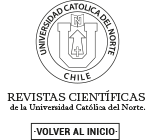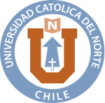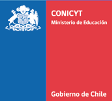“Chilote tipo salmón”. The relationship between nature commodification and identity production processes
The case of the salmon industry in Los Lagos Region, Chile
DOI:
https://doi.org/10.22199/issn.0718-1043-2019-0026Keywords:
identity, salmoniculture, neoliberalism, comoditization, Los Lagos RegionAbstract
This paper uses the case of the installation of the salmon industry in the Los Lagos region, to review the relationship between territorial commoditization and identity. In this work we identify the processes through which the materiality of the salmon could alter or trigger transformations in the local identity. From a review and discussion of the literature on neoliberalism as forms of production of citizenship and subjectivity, with special emphasis on that exploring the Latin American case, but also the literature from political ecology on commoditization of nature, we answer the following question: what strategies have been generated among local actors for facing effect on their identities of the arrival and production of the salmon commodity? We argue from political ecology and related approaches, the thesis that the commoditization of nature and territory not only implies the control or co-production of the environment but is also interwoven with processes of identity and citizenship formation. In other words, certain forms of identities are articulated through the management and control of nature and territory, which in turn influence said management.
References
Agrawal, A. (2005). Environmentality: technologies of government and the making of subjects. Durham, NC: Duke University Press.
Arismendi, I., Soto, D., Penaluna, B., Jara, C., Leal, C. y Leon-Munoz, J. (2009). Aquaculture, non-native salmonid invasions and associated declines of native fishes in Northern Patagonian lakes. Freshwater Biology, 54(5), 1135-1147. doi:10.1111/j.1365-2427.2008.02157.x
Barth, F. (1969). Introduction. En Barth, F. (Ed.). Ethnic Groups and Boundaries (pp. 9-38). Boston: Little Brown.
Barton, J. R. (1997). ¿Revolución Azul? El impacto regional de la acuicultura del salmón en Chile. Eure – Revista Latinoamericana de Estudios Urbanos Regionales, 22(68), pp. 57-76.
Barton, J. R., Gwynne, R. N. y Murray, W. E. (2007). Competition and co-operation in the semi-periphery: closer economic partnership and sectoral transformations in Chile and New Zealand. Geographical Journal, 173(3), 224-241.
Barton, J. R., Gwynne, R. N. y Murray, W. E. (2008). Transformations in resource peripheries: an analysis of the Chilean experience. Area, 40(1), 24-33.
Barton, J. R. y Murray, W. E. (2009). Grounding Geographies of Economic Globalisation: Globalised Spaces in Chile’s Non-Traditional Export Sector, 1980-2005. Tijdschrift voor economische en sociale geografie, 100(1), 81-100.
Bebbington, A. (1993). Modernization from Below: An Alternative Indigenous Development? Economic Geography, 69(3), 274-292.
Boisier, S. (1998). Post-scriptum sobre desarrollo regional: Modelos reales y modelos mentales. Eure – Revista Latinoamericana de Estudios Urbanos Regionales, 24 (Santiago), 53-69.
Boisier, S. (2000). Chile: la vocación regionalista del gobierno militar. EURE, 26 (Santiago), 81-107.
Boisier, S. (2004). Desarrollo territorial y descentralización: El desarrollo en el lugar y en las manos de la gente. Eure – Revista Latinoamericana de Estudios Urbanos Regionales, 30(90), 27-40.
Bolados García, P. (2012). Neoliberalismo multicultural en el Chile postdictadura: la política indígena en salud y sus efectos en comunidades mapuches y atacameñas. Chungara. Revista de Antropología Chilena, 44 (Arica), 135-144.
Borras S. M. (2010). Critical Perspectives in Rural Development Studies. Critical Agrarian Studies. UK: Routledge, 258.
Borras, S. M. y Franco, J. C. (2013). Global Land Grabbing and Political Reactions 'From Below’. Third World Quarterly, 34(9), 1723-1747.
Bridge G. (2000). The social regulation of resource access and environmental impact: production, nature and contradiction in the US copper industry. Geoforum, 31, 237-256.
Bridge, G. (2001). Resource triumphalism: postindustrial narratives of primary commodity production. Environment and Planning A: Economy and Space, 33(12), 2149-2173.
Budds J. (2004). Power, nature and neoliberalism: The political ecology of water in Chile. Singapore Journal of Tropical Geography, 25, 322-342.
Buschmann A. (2001). Impacto ambiental de la acuicultura: el estado de la investigación en Chile y el mundo. Un análisis bibliográfico de los avances y restricciones para una producción sustentable en los sistemas acuáticos. En Terram (Ed.). Santiago: Fundacion Terram, 67.
Buschmann, A. H., Riquelme, V. A., Hernández-González, M. C., Varela, D., Jiménez, J. E., Henríquez, L. A. y Filún, L. (2006). A review of the impacts of salmonid farming on marine coastal ecosystems in the southeast Pacific. Ices Journal of Marine Science, 63(7), 1338-1345. doi:10.1016/j.icesjms.2006.04.021
Buschmann, A. H., Riquelme, V. A., Hernández-González, M. C., Varela, D., Jiménez, J. E., Henríquez, L. A. y Filún, L. (2006). A review of the impacts of salmonid farming on marine coastal ecosystems in the southeast Pacific. Ices Journal of Marine Science, 63(7), 1338-1345. doi:10.1016/j.icesjms.2006.04.021
Bustos, B. (2014). Moving on? Neoliberal continuities through crisis – the case of the Chilean salmon industry and the ISA virus. Environment and Planning C, 33, 1361-1375.
Bustos-Gallardo, B. e Irarrázaval F. (2016). “Throwing Money into the Sea”: Capitalism as a World-ecological System. Evidence from the Chilean Salmon Industry Crisis, 2008. En Capitalism Nature Socialism, 27(3), 83, 102.
Bustos-Gallardo B. (2012). Brote del virus ISA: crisis ambiental y capacidad de la institucionalidad ambiental para manejar el conflicto. Eure – Revista Latinoamericana de Estudios Urbanos Regionales, 38: 219-246.
Bustos-Gallardo, B., Prieto, M. y Barton, J. (2015). Ecología Política en Chile. Poder, naturaleza, conocimiento y propiedad. Santiago: Editorial Universitaria.
Calderón, M., Díaz, R., Morales, C. et al. (2013). Territorios rurales y neoliberalismo en Chile: Conflictos económicos y sus expresiones políticas en zonas de vitivinícolas, forestales e industrias salmoneras. Cuadernos de antropología social, 38, 153-176.
Canales, C. (2006). Transformaciones socioculturales, económicas y medioambientales en la localidad de Quellón, como consecuencia de la expansión de la industria salmonera y del proceso urbanizador, en el marco de las teorías de la nueva ruralidad y sociedad del riesgo. Tesis para optar al título de Socióloga. Departamento de Sociología, Facultad de Ciencias Sociales, Universidad de Chile. Santiago.
Castree, N. (2003). Commodifying what nature? Progress in Human Geography, 27(3), 273-297.
Cohen, A. (1974). Masquerade politics explorations in the structure of urban cultural movements. Berkeley: University of California Press.
Collins, J. y Lear, J. (1995). Chile’s free market miracle: a second look: Institute for food and development policy.
Ellen, R. (2006). Forest knowledge, forest transformation: political contingency, historical ecology and the renegotiation of nature in central Seram. En Dove, M. y Carpenter, C. (Eds.). Ecological anthropology: a reader (pp. 321-335). Oxford: Blackwell.
Escobar A. (2008). Territories of difference. Place, movements, life, redes Durham, NC: Duke University Press.
Fairhead, J., Leach, M. y Scoones, I. (2012). Green Grabbing: a new appropriation of nature? Journal of Peasant Studies, 39(2), 237-261.
Ferguson, J. (2006). Global shadows. Africa in the neoliberal world order. Durham– London: Duke University Press.
Ffrench-Davis, R. (1999). Chile entre el neoliberalismo y el crecimiento con equidad: tres décadas de política económica en Chile. Santiago: Dolmen Ediciones.
Floysand, A., Haarstad, H. y Barton, J. (2010). Global economic imperatives, crisis generation and local spaces of engagement in the Chilean aquaculture industry. Norsk Geografisk Tidsskrift-Norwegian Journal of Geography, 64, 199-210.
Foucault, M. (2008). The birth of biopolitics: lectures at the Collège de France, 1978-79. Palgrave Macmillan, Basingstoke [England] – New York: Palgrave Macmillan
French, J. H. (2002). Dancing for Land: Law-Making and Cultural Performance in Northeastern Brazil. Legal Anthropology Review, 25(1), 19-36.
García Canclini, N. (2002). La Globalización imaginada: Paidós Ibérica.
Geertz, C. (1962). The Integrative Revolution: Primordial Sentiments and Civil Politics in the New States. En Geertz, C. (Ed.). Old Societies and New States (pp. 105-157). The Free Press: The Free Press.
Gómez, S. (2003). Chile: Expansión del cultivo e industria del salmón y agricultura familiar campesina (nueva ruralidad y persistencia campesina). Revista de Sociología, 149-163.
Green, K. E., Adams, W. M. (2015). Green grabbing and the dynamics of local-level engagement with neoliberalization in Tanzania’s wildlife management areas. Journal of Peasant Studies, 42(1), 97-117.
Gwynne, R. (2004). The spaces of neoliberalism: Land, place and family in Latin America. Journal of Latin American Studies, 36, 413-415.
Gwynne, R. N. y Kay, C. (2000). Views from the periphery: futures of neoliberalism in Latin America. Third World Quarterly, 21, 141-156.
Hale, C. (2002). Does Multiculturalism Menace? Governance, Cultural Rights and the Politics of Identity in Guatemala. Journal of Latin American Studies, 34(3), 485-524,
Halverson A. (2011). An Entirely Synthetic Fish: How Rainbow Trout Beguiled America and Overran the World. New Haven, CT: Yale University Press.
Hall, S. (1995). Negotiating Caribbean Identities. New Left Review, 209, 3-14.
Harvey, D. (2005). A brief history of neoliberalism. New York, NY: Oxford university Press.
Hebert, K. (2014). The matter of market devices: Economic transformation in a southwest Alaskan salmon fishery. Geoforum, 53, 21-30.
Hebert, K. (2015). Enduring capitalism: instability, precariousness, and cycles of change in an Alaskan salmon fishery. American Anthropologist, 117, 32-46.
Holmes, G. (2014). What is a land grab? Exploring green grabs, conservation, and private protected areas in southern Chile. Journal of Peasant Studies, 41(4), 547-567
INE Los Lagos (2014). “Fuerza de Trabajo Ocupada por Rama Actividad Económica Provincia. Según Trimestre Móviles Ene-Mar/92 a la fecha”. Recuperado de: http://www.ineloslagos.cl/app/bancodatos/bancodatos.htm
Izquierdo-Gómez, D., Bayle-Sempere, J. T., Arreguin-Sánchez, F., y Sánchez-Jerez, P. (2016). Modeling population dynamics and small-scale fisheries yields of fish farming escapes in Mediterranean coastal areas. Ecological Modelling, 331, 56-67. doi:10.1016/j.ecolmodel. 2016.01.012
Kappeler, A., Bigger, P. (2011). Nature, Capital and Neighborhoods: “Dispossession without Accumulation”? Antipode, 43(4), 986-1011.
Larner, W. (2003). Neoliberalism? Environment and Planning D-Society y Space, 21, 509-512.
Larner, W. (2006). Capital resurgent: roots of the neoliberal revolution. Progress in Human Geography, 30, 681-683.
Li, T. (2000). Articulating Indigenous Identity in Indonesia: Resource Politics and the Tribal Slot. Comparative Studies in Society and History, 42(1), 149-179
López, E., Meza, D. y Gasic, I. (2014). Neoliberalismo, regulación ad-hoc de suelo y gentrificación: el historial de la renovación urbana del sector Santa Isabel, Santiago. Revista de Geografía Norte Grande, 58, 161-177.
Moulian, T. (1997). Chile Actual: Anatomía de un mito. Santiago: LOM Ediciones.
Munck, R. (2003). Neoliberalism, necessitarianism and alternatives in Latin America there is no alternative (TINA)? Third World Quarterly, 24(3), 495-511.
Murray, W. E. y Overton J. D. (2011). Neoliberalism is dead, long live neoliberalism? Neostructuralism and the international aid regime of the 2000s. Progress in Development Studies, 11, 307-319.
Neves, K. y Igoe, J. (2012). Uneven Development and Accumulation by Dispossession in Nature Conservation: Comparing Recent Trends In The Azores And Tanzania. Tijdschrift voor Economische En Sociale Geografie, 103(2), 164-179.
Nevins, J. y Peluso, N. L. (2008). Taking Southeast Asia to market: commodities, nature, and people in the neoliberal age. Ithaca, NY: Cornell University Press.
Niklitschek, E. J., Soto, D., Lafon A. et al. (2013). Southward expansion of the Chilean salmon industry in the Patagonian Fjords: Main environmental challenges. Reviews in Aquaculture, 5, 172-195.
Ong, A. (2006). Neoliberalism as exception: mutations in citizenship and sovereignty. Durham: NC: Duke University Press.
Peck, J. (2001). Neoliberalizing states: thin policies/hard outcomes. Progress in Human Geography, 25, 445-455.
Peck, J. y Tickell, A. (2002). Neoliberalizing space. Antipode, 34, 380-404.
Peluso, N. L. (2012). What’s nature got to do with it? A situated historical perspective on socio-natural commodities. Development and Change, 43, 79-104.
Polanyi, K. (1957). The great transformation. Boston, MA: Beacon Press.
Postero, N. G. (2007). Now we are citizens: indigenous politics in postmulticultural Bolivia. Stanford, CA: Stanford University Press.
Prieto, M. (2016). Transando el agua, produciendo territorios e identidades indígenas: el modelo de aguas chileno y los atacameños de Calama. Revista de Estudios Sociales, 55(55), 88-103. doi:10.7440/res55.2016.06
Prudham, S. (2009). Commodification. En Castree, N., Demeritt, D., Liverman, D., Rhoads, B. (Eds.). A Companion to Environmental Geography (pp. 123-142). Oxford, UK: Wiley-Blackwell.
Radcliffe, S. A. (2005). Neoliberalism as we know it, but not in conditions of its own choosing: a commentary. Environment and Planning A, 37, 323-329.
Robbins, P. (2004). Political Ecology: a Critical Introduction. Malden, MA: Blackwell
Robbins, P. (2011). Political Ecology: a Critical Introduction. Malden, MA: Blackwell
Román, Á., Barton, J. R., Bustos, B. et al. (2015). Revolución salmonera: paradojas y transformaciones territoriales en Chiloé. En UC Instituto de Estudios Urbanos y Territoriales (Ed.). Santiago de Chile: RIL Editores, 274 pp.
Roy A., Larner, W. y Peck, J. (2012). Constructions of Neoliberal Reason. Progress in Human Geography, 36, 273-281.
Saavedra, G., Macías, A. (2012) Tradición e innovación en las comunidades de pesca artesanal del sur de Chile: Hacia un enfoque reflexivo del desarrollo endógeno. Revista de Antropología Iberoamericana, 7(1), 33-63. Recuperado de http://www.redalyc.org/pdf/623/62322227003.pdf
SalmonChile (2015). “Producción”. Recuperado de http://www.salmonchile.cl/es/produccion.php.
Scott, J. C. (2009). The art of not being governed: an anarchist history of upland Southeast Asia. New Haven, CT: Yale University Press.
Sepúlveda, M., Arismendi, I., Soto, D., Jara, F., y Farías, F. (2013). Escaped farmed salmon and trout in Chile: incidence, impacts, and the need for an ecosystem view. Aquaculture Environment Interactions, 4(3), 273-283. doi:10.3354/aei00089
Shils, E. (1957). Center and Periphery: Essays in Macrosociology. Selected Papers of Edward Shils (Vol. II). Chicago, IL: University of Chicago Press.
Solimano A. (2014). Chile and the neoliberal trap. Cambridge, MA: Cambridge Books, Cambridge University Press.
Soto, D., y Jara, F. (2007). Using natural ecosystem services to diminish salmon-farming footprints in southern Chile. En Bert, T. M. (Ed.). Ecological and Genetic Implications of Aquaculture Activities, 6, 459-475.
Subpesca (2016). http://www.subpesca.cl/institucional/602/w3-propertyvalue-50924.html
Sundberg, J. (2004). Identities in the making: conservation, gender and race in the Maya Biosphere Reserve, Guatemala. Gender, Place & Culture, 11(1), 43-66.
Swanson H. A. (2015). Shadow ecologies of conservation: Co-production of salmon landscapes in Hokkaido, Japan, and southern Chile. Geoforum, 61, 101-110.
Tria Kerkvliet, B. J. (2010). Everyday politics in peasant societies (and ours). En Borras, S. M. (Ed.). Critical Perspectives in Rural Development Studies (pp. 215-231). Critical Agrarian Studies. Routledge, 258.
Valenzuela, R. (2016). La naturaleza no da: exclusión y apropiación de la naturaleza en el contexto post crisis del ISA en Cochamó. Tesis para optar al título de Antropóloga, Universidad de Chile.
Wainwright, J. (2008). Decolonizing development: colonial power and the Maya. Malden, MA: Blackwell Pub.
Walters B. B. (2007). Competing use of marine space in a modernizing fishery: salmon farming meets lobster fishing on the Bay of Fundy. Canadian Geographer-Geographe Canadien, 51, 139-159.
Winn P. (2004). Victims of the Chilean Miracle, workers and neoliberalism in the Pinochet era, 1973-2002. Durham, NC: Duke University Press.
Published
How to Cite
Issue
Section

All works published in Revista Estudios Atacameños (ISSN on line:0718-1043) Revista Estudios Atacameños Creative Commons International 4.0 attribution (CC BY 4.0) licence.
Authors remain the owners of their work and may republish their articles elsewhere without having to request permission, as long as they indicate that the work was originally published in Revista Estudios Atacameños (ISSN on liine:0718-1043).

















